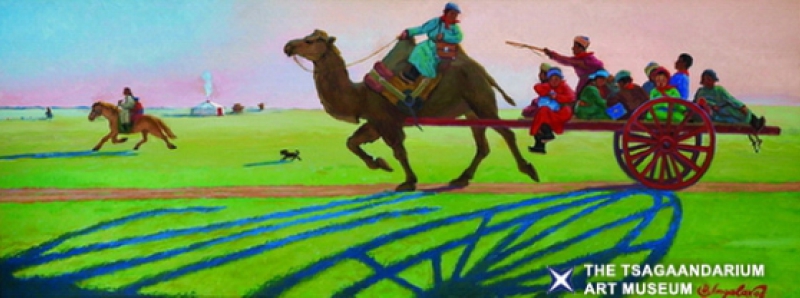
IN THE SPOTLIGHT
FERDINAND DIEDRICH LESSING
Ferdinand Lessing is a notable figure in Mongolian studies for initiating the study of the Mongolian language in the United States at the University of California, Berkeley. He also authored the first scholarly Mongolian-English Dictionary.
Ferdinand Diedrich Lessing was born on February 26, 1882, in Essen, Germany. Even as a young boy, he was animated by an insatiable curiosity about the varieties of human linguistic experience and manifested his remarkable talent as a polyglot. When barely twenty, he directed his interests to the then exotic world of China and Inner Asia and was fortunate to come under the guidance of F. W. K. Müller, the most rigorous and erudite of the scholars grouped around the Berlin Ethnographical Museum and engaged in the multilingual research on the newly discovered monuments of Central Asia. In 1907 he went to China where he remained for some seventeen years vigorously pursuing linguistic and ethnographic studies while supporting himself and his now growing family by teaching modern and ancient languages in various Chinese and Japanese colleges.
Ferdinand Lessing returned to Germany in 1925 to complete his doctorate and become Professor of Chinese at the Seminar für Orientalische Sprachen. Two years later he succeeded his esteemed teacher F. W. K. Müller as curator at the Museum. In the early thirties he participated in the Sino-Swedish Expedition under the leadership of the great Swedish explorer Sven Hedin in North China and Mongolia and continued his independent or museum-sponsored researches through various trips as far as Tonkin. In 1935 he was called to Berkeley to head the reorganized Department of Oriental Languages and to become the fourth scholar to occupy the first-established of the endowed chairs at the University, the Agassiz Professorship of Oriental Languages and Literature. The program of the department was greatly broadened under his chairmanship notably through the inauguration of courses in Mongolian and Tibetan, the first offerings of systematic instruction in these languages in the United States. An indefatigable teacher, he guided the first steps of beginners or encouraged the probing researches of graduate students, all with equal patience and diligence, in at least seven Oriental languages (Chinese, Japanese, Sanskrit, Tibetan, Pali, Mongolian, and Manchu) for seventeen years, having been recalled to active duty three years beyond the normal date of retirement.
Early in his career, Professor Lessing became deeply interested in Buddhism and particularly in the Lamaistic form of that faith, which was so instrumental in shaping the life of the inner borderlands of China, Mongolia, and Tibet. His researches in that difficult field were especially stimulated by the opportunity that presented itself to him, while a member of the Hedin expedition, to study closely the Yung-hokung Cathedral in Peking, an outstanding monument of Lamaist history and Manchu ecclesiastic policy.
In 1942, in conjunction with some World War II instruction undertaken at the University, he embarked upon a vast project which occupied him intermittently for eighteen years, the first scholarly Mongolian-English Dictionary. Professor Lessing was uniquely qualified to undertake this task not only by his thorough knowledge of the four pertinent idioms involved in the compilation of the extensive lexicon, namely Mongolian, Tibetan, Sanskrit, and Chinese, but also by his mastery of the Russian language, the chief vehicle of Western Mongolistics. The successful completion of this arduous work was cited as the most spectacular achievement of his long and distinguished career as an Orientalist at the time the University conferred upon him the honorary degree of Doctor of Laws at the 1960 Charter Day exercises. Though modest and self-effacing, he particularly prized that last honor among the several he received during the last part of his life.
P. A. Boodberg Y. R. Chao M. C. Rogers

